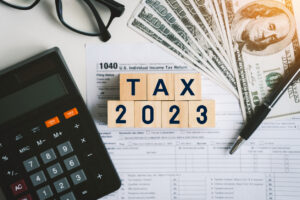As an owner-operator, it is important to understand your tax obligations. The tax deadline is important for owner-operators to know as it determines when you should file your tax returns and pay any outstanding tax balances. Below you will learn more about the tax deadline, things to consider, and how to comply with tax regulations.

Tax Deadlines for Owner-Operators
The 2023 tax deadline for owner-operators is April 18, 2023; however, if you cannot make this file date, you can opt for an extension to October 15, 2023. It is important to stay current on any extensions or changes from the Internal Revenue Service (IRS) to avoid any interest or penalty charges.
Organizing Financial Records
Starting with tax prep begins with organizing your financial records. It is important as an owner-operator to maintain accurate and up-to-date records throughout the year. You should keep track of any expenses incurred, income, fuel receipts, maintenance, and toll expenses. This will help keep filing your taxes less stressful and ensure accurate reporting.
Correct Tax Filing Method
As an owner-operator, you have two options when filing your taxes: Sole Proprietor or a separate legal entity as an LLC or S Corporation. Each type has its own advantages and disadvantages. You should talk with a tax professional to determine which route is best for your business. When deciding which type is best for your business, you should consider liability protection, tax deductions, and other requirements.
Understanding Deductible Expenses
Owner-operators can deduct many things as business expenses, to help reduce their taxable income. Some standard deductions for owner-operators include:
- Fuel costs
- Maintenance
- Repairs
- Insurance premiums
- Equipment purchases
- Permits
- Licenses
- Meals and lodging while on the road.
- Office Supplies
You should keep detailed records of these expenses and talk with a tax professional to ensure you get all the deductions you are entitled to.
Quarterly Tax Payments
As an owner-operator, you must make quarterly tax payments yearly to avoid underpayment penalties. These payments are often based on your projected income and the self-employment tax regulations. You will need to calculate these payments and submit them to the IRS. Working with an accountant or a tax professional can help ensure you make payments at the right time and have a better estimate of how much you should be paying quarterly.
Tax Filing Extensions
If you need additional time to help prepare your tax return, request a tax filing extension with the IRS. For owner-operators, the extension is typically six months following the original deadline. Knowing when this extension is up is important, so you do not have to pay any penalties.
Consequences and Penalties
Failure to meet the tax deadline or not following the tax regulations can cause you to face consequences and financial penalties. Late payment penalties, late filing penalties, and interest charges are all things that the IRS can impose. Ensuring you meet the tax filing deadline, accurate reporting, and your tax obligations is important.
Following the tax deadline is an important responsibility, especially for owner-operators. Understanding the importance of keeping your financial records and seeking assistance from a tax professional can help you navigate your taxes with confidence and ease.

